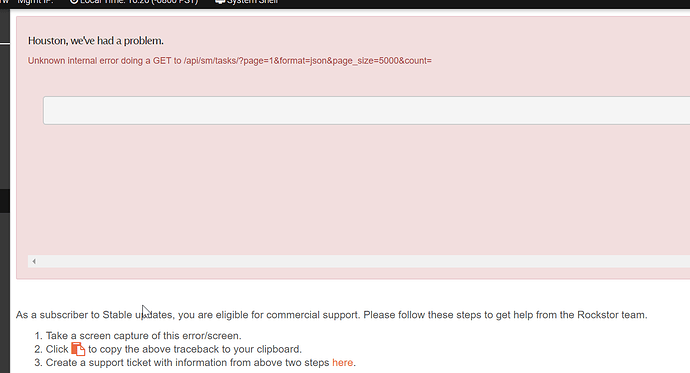@Suman,
I am on 3.9.2-9 now, but the error seems to persist. To be sure, I rebooted the system and executed the Scheduled tasks again. Here’s the tail again, the only difference to the previous one I can currently see is that the application is now complaining about another share (one I’ve set up for the RockOn service):
[28/Dec/2017 09:07:58] ERROR [storageadmin.middleware:32] Exception occured while processing a request. Path: /api/sm/tasks/ method: GET
[28/Dec/2017 09:07:58] ERROR [storageadmin.middleware:33] invalid literal for int() with base 10: 'RockOnShare’
Traceback (most recent call last):
File “/opt/rockstor/eggs/Django-1.8.16-py2.7.egg/django/core/handlers/base.py”, line 132, in get_response
response = wrapped_callback(request, *callback_args, **callback_kwargs)
File “/opt/rockstor/eggs/Django-1.8.16-py2.7.egg/django/views/decorators/csrf.py”, line 58, in wrapped_view
return view_func(*args, **kwargs)
File “/opt/rockstor/eggs/Django-1.8.16-py2.7.egg/django/views/generic/base.py”, line 71, in view
return self.dispatch(request, *args, **kwargs)
File “/opt/rockstor/eggs/djangorestframework-3.1.1-py2.7.egg/rest_framework/views.py”, line 452, in dispatch
response = self.handle_exception(exc)
File “/opt/rockstor/eggs/djangorestframework-3.1.1-py2.7.egg/rest_framework/views.py”, line 449, in dispatch
response = handler(request, *args, **kwargs)
File “/opt/rockstor/eggs/djangorestframework-3.1.1-py2.7.egg/rest_framework/generics.py”, line 241, in get
return self.list(request, *args, **kwargs)
File “/opt/rockstor/eggs/djangorestframework-3.1.1-py2.7.egg/rest_framework/mixins.py”, line 44, in list
return self.get_paginated_response(serializer.data)
File “/opt/rockstor/eggs/djangorestframework-3.1.1-py2.7.egg/rest_framework/serializers.py”, line 618, in data
ret = super(ListSerializer, self).data
File “/opt/rockstor/eggs/djangorestframework-3.1.1-py2.7.egg/rest_framework/serializers.py”, line 213, in data
self._data = self.to_representation(self.instance)
File “/opt/rockstor/eggs/djangorestframework-3.1.1-py2.7.egg/rest_framework/serializers.py”, line 568, in to_representation
self.child.to_representation(item) for item in iterable
File “/opt/rockstor/eggs/djangorestframework-3.1.1-py2.7.egg/rest_framework/serializers.py”, line 426, in to_representation
attribute = field.get_attribute(instance)
File “/opt/rockstor/eggs/djangorestframework-3.1.1-py2.7.egg/rest_framework/fields.py”, line 299, in get_attribute
return get_attribute(instance, self.source_attrs)
File “/opt/rockstor/eggs/djangorestframework-3.1.1-py2.7.egg/rest_framework/fields.py”, line 70, in get_attribute
instance = getattr(instance, attr)
File “/opt/rockstor/src/rockstor/smart_manager/models/task_def.py”, line 52, in share_name
sn = Share.objects.get(id=task_metadata[‘share’]).name
File “/opt/rockstor/eggs/Django-1.8.16-py2.7.egg/django/db/models/manager.py”, line 127, in manager_method
return getattr(self.get_queryset(), name)(*args, **kwargs)
File “/opt/rockstor/eggs/Django-1.8.16-py2.7.egg/django/db/models/query.py”, line 325, in get
clone = self.filter(*args, **kwargs)
File “/opt/rockstor/eggs/Django-1.8.16-py2.7.egg/django/db/models/query.py”, line 679, in filter
return self._filter_or_exclude(False, *args, **kwargs)
File “/opt/rockstor/eggs/Django-1.8.16-py2.7.egg/django/db/models/query.py”, line 697, in _filter_or_exclude
clone.query.add_q(Q(*args, **kwargs))
File “/opt/rockstor/eggs/Django-1.8.16-py2.7.egg/django/db/models/sql/query.py”, line 1310, in add_q
clause, require_inner = self._add_q(where_part, self.used_aliases)
File “/opt/rockstor/eggs/Django-1.8.16-py2.7.egg/django/db/models/sql/query.py”, line 1338, in _add_q
allow_joins=allow_joins, split_subq=split_subq,
File “/opt/rockstor/eggs/Django-1.8.16-py2.7.egg/django/db/models/sql/query.py”, line 1209, in build_filter
condition = self.build_lookup(lookups, col, value)
File “/opt/rockstor/eggs/Django-1.8.16-py2.7.egg/django/db/models/sql/query.py”, line 1102, in build_lookup
return final_lookup(lhs, rhs)
File “/opt/rockstor/eggs/Django-1.8.16-py2.7.egg/django/db/models/lookups.py”, line 105, in init
self.rhs = self.get_prep_lookup()
File “/opt/rockstor/eggs/Django-1.8.16-py2.7.egg/django/db/models/lookups.py”, line 143, in get_prep_lookup
return self.lhs.output_field.get_prep_lookup(self.lookup_name, self.rhs)
File “/opt/rockstor/eggs/Django-1.8.16-py2.7.egg/django/db/models/fields/init.py”, line 727, in get_prep_lookup
return self.get_prep_value(value)
File “/opt/rockstor/eggs/Django-1.8.16-py2.7.egg/django/db/models/fields/init.py”, line 985, in get_prep_value
return int(value)
ValueError: invalid literal for int() with base 10: ‘RockOnShare’


